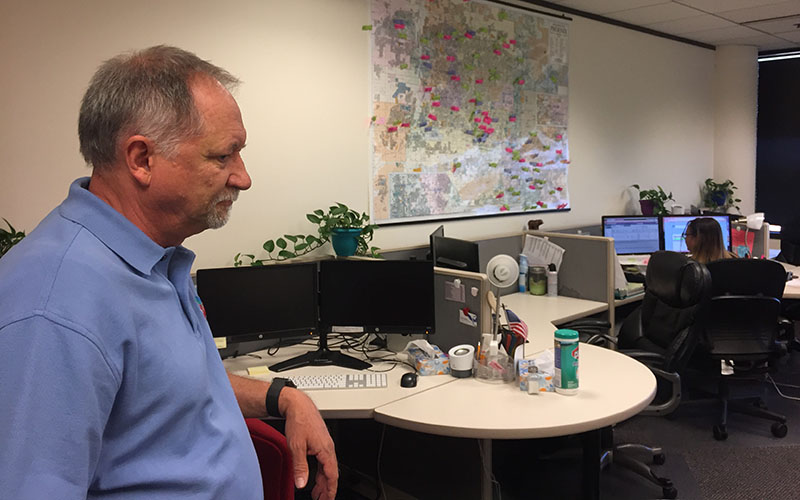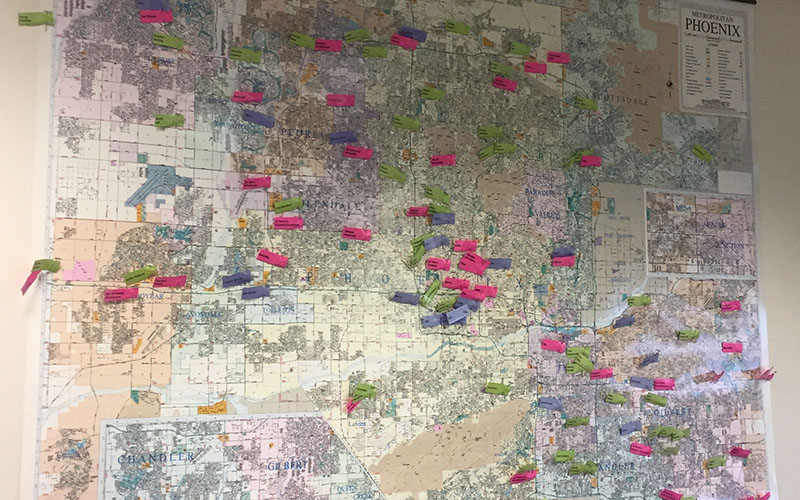
Tom McSherry has been in the crisis prevention and response business for more than 30 years. (Photo by Kianna Gardner/Cronkite News)
PHOENIX — Those impacted – directly or indirectly – by traumatic events such as the Las Vegas shooting can experience changes in their mental health for days, weeks and even years after the fact.
Everyone experiences tragedy a little differently and will have varying symptoms and coping methods, mental health experts said.
This reaction depends on many things, including how someone was exposed to the trauma, previous background with trauma and what they have witnessed in their lives prior to the trauma. Regardless of how someone handles crisis scenarios, experts said there are methods for recovery.
“For folks recovering from events like this, it’s really an A plus B equals C formula,” said Tom McSherry, president and founder of Arizona-based mental health care provider Crisis Preparation and Recovery. He described “A” as the event, “B” as how the event is viewed and “C” as the emotional reaction.
“If I can’t change A, and I’m not happy with C, then I need to change my perspective,” McSherry said. “I have to put it in a narrative that I can live with.”
One should pay attention to their body to know how the event has taken a toll on them. McSherry said there are five bodily changes that may occur: physical, emotional, cognitive, behavioral and spiritual.
“These are very common after events like these, it’s just the body saying, ‘Hello, this was a different day, now you need to take care of me,'” McSherry said.
And there are multiple methods of caring for one’s mind and body as recommended by mental health experts across the Valley.
Re-establish normalcy
Those struggling tend to immediately neglect the basics of everyday life: eating, drinking water, exercising and sleeping.
Physical activity causes the brain to produce serotonin, which contributes to our happiness levels, McSherry said.
When someone is in an anxious state, they struggle with normal activities, but re-establishing those patterns help calm the body and mind.
Distance yourself from constant reminders
Someone may need to distance themselves from things that may “trigger” a negative reaction and remind them of what they experienced.
Triggers are sometimes things people once really enjoyed but now cause a reaction. For people in Las Vegas who attended the Route 91 Harvest country music festival, a trigger may be country music.
“These things are something that people actually like and made them very happy, but now it gives them anguish,” said Darwyn Chern, the vice president of clinical services for Partners in Recovery, another Valley-based mental health care provider.
Sometimes overexposure to the news and social media can serve as a trigger.
“It’s important to unplug,” said Leanette Henagan, chief integration officer at Partners in Recovery. “We are inundated every day with TV, social media and everything so it’s important to take a breather.”
Henagan said the frequency with which these events occur, such as hurricanes and then shootings, can be “really overwhelming.” In some cases, people can lose empathy for such tragedies if they are constantly connected.
Establish a support system
Family and friends become some of the most significant resources for recovery, experts said.
“People are sometimes hesitant to reach out because they believe they may be the only ones experiencing this, when in fact, it’s the exact opposite,” McSherry said.
The body sometimes releases a hormone known as oxytocin during times of stress, and it causes humans to be more social and encourages communication. This communication can lead to a quicker rebound from the event.
Another form of support can come from remembering successful coping strategies from a similar event prior to the current one, McSherry said.
For instance, if watching a specific movie or book made someone feel at peace, they should resort back to that.
Seeking professional help

A map in Tom McSherry’s office shows where mental health facilities and specialists are throughout Arizona in case a patient must be relocated. (Photo by Kianna Gardner/Cronkite News)
Should victims and witnesses of an event have persistent negative reactions, there are resources available. In Arizona, Partners in Recovery and Crisis Preparation and Recovery are just two of many mental health care providers.
Crisis Preparation and Recovery handles about 85,000 patient contacts a year and has established a call team that takes 24-7 emergency response calls from those experiencing extreme depression and anxiety.
Partners in Recovery is a nonprofit that serves thousands of patients from Kingman to the Valley, with plans to possibly expand further south.
“Help is available for anyone who seeks it, and people need to know that what they are experiencing, many others are too,” Chern said.
“From that concert alone, there are now more than 22,000 pre-existing conditions from people who were there,” Henagan said. “Mental health problems are not uncommon.”